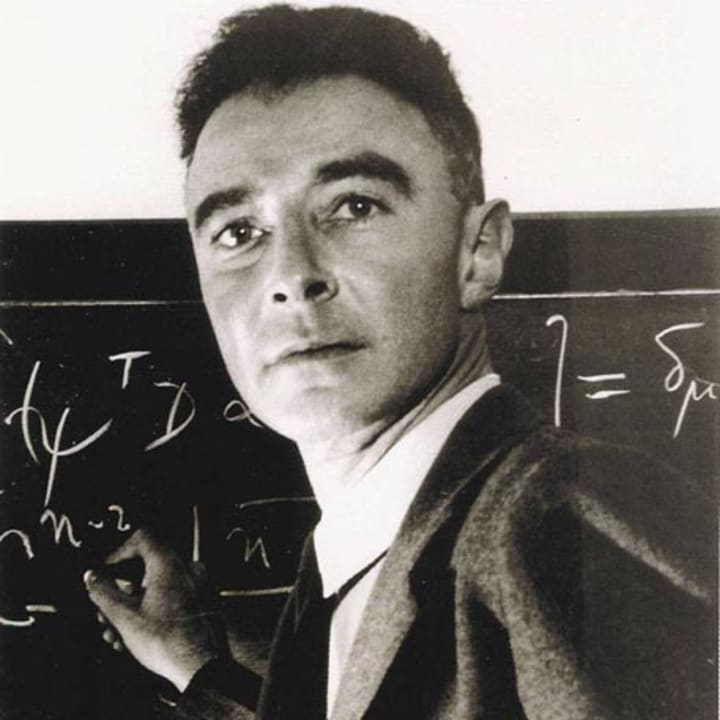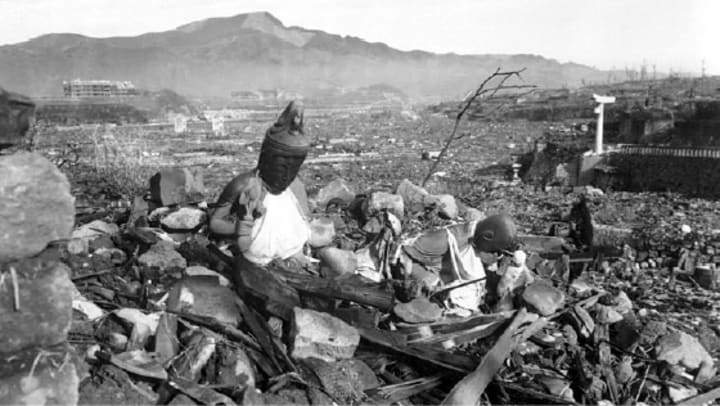Unleashing the Power of the Atom: The Story of J. Robert Oppenheimer and the Manhattan Project
Father of the Atomic Bomb
Who is Oppenheimer?
You would have come across this name in the recent past. Thanks to Christopher Nolan, who is now making a film about this mastermind scientist. We will get a deep dive into the real history. J. Robert Oppenheimer was a theoretical physicist and professor at the University of California, Berkeley. He is best known for his role as the scientific director of the Manhattan Project, a top-secret research project during World War II that aimed to develop the first nuclear weapons. Oppenheimer was responsible for overseeing the scientific research and development of the atomic bomb, and his leadership and expertise played a crucial role in the project's success. He is often referred to as the "father of the atomic bomb" for his contributions to this historic achievement.
Thesis statement
This highlights the importance of Oppenheimer's role in the development of the first nuclear weapons, specifically his leadership and scientific expertise. Oppenheimer was a highly respected scientist and his knowledge and understanding of theoretical physics and nuclear science made him the ideal candidate to lead the Manhattan Project. He was able to bring together a team of top scientists and engineers and provided the guidance and leadership necessary to turn the theoretical concepts of nuclear fission into a working weapon. Oppenheimer's leadership and expertise were critical to the success of the project and the creation of the atomic bomb, making him a key figure in the history of atomic energy.
Early Life and Education
Oppenheimer's background and upbringing
J. Robert Oppenheimer was born in New York City in 1904 to a wealthy and cultured family. His father, Julius Oppenheimer, was a successful textile importer, and his mother, Ella Friedman Oppenheimer, was a painter and musician. Oppenheimer was the eldest of three children and grew up in a cosmopolitan household where he was exposed to art, literature, and music. He was a precocious child and showed an early aptitude for science and mathematics.
Oppenheimer was educated at the Ethical Culture Fieldston School in New York City, where he excelled academically and was an active member of the school's science club. He then attended Harvard University, where he earned a Bachelor of Arts degree in chemistry and physics in 1925. He went on to study at the University of Cambridge in England and at the University of Göttingen in Germany, where he received his doctorate in physics in 1927.
Throughout his upbringing and education, Oppenheimer was exposed to diverse perspectives and cultures, which would later shape his worldview and his commitment to social issues, such as civil rights and nuclear disarmament. He was also known for his deep interest in literature and philosophy, which he believed would help him understand the complex ethical and moral issues surrounding the atomic bomb.

His education and early interest in science
Oppenheimer's education and early interest in science played a significant role in his development as a scientist and his eventual leadership in the Manhattan Project. He showed an early aptitude for science and mathematics, and excelled academically throughout his schooling. He attended the Ethical Culture Fieldston School in New York City, where he was a member of the science club, and then went on to earn a Bachelor of Arts degree in chemistry and physics from Harvard University.
After completing his undergraduate studies, Oppenheimer travelled to Europe to further his education in physics. He studied at the University of Cambridge in England, where he worked with some of the leading scientists in the field, and then at the University of Göttingen in Germany, where he received his doctorate in physics in 1927. It was during this time that he developed a deep interest in theoretical physics, specifically in quantum mechanics and the study of subatomic particles.
Oppenheimer's education and early interest in science provided him with the knowledge and expertise needed to lead the scientific research and development of the atomic bomb. His deep understanding of theoretical physics, his ability to bring together a team of top scientists, and his leadership skills were crucial in the successful development of the first nuclear weapon.
His transition from theoretical physics to nuclear science
Oppenheimer's transition from theoretical physics to nuclear science was a natural progression of his interests and expertise. After completing his doctorate in physics from the University of Göttingen in 1927, he returned to the United States and began working as a professor of physics at the California Institute of Technology. He also worked as a visiting professor at several universities, including the University of Michigan and the University of California, Berkeley.
During this time, Oppenheimer became increasingly interested in the study of subatomic particles and the newly discovered field of quantum mechanics. He began to focus on the theoretical aspects of nuclear physics, which led to his appointment as the director of the theoretical physics division at the Berkeley Radiation Laboratory in 1939.
Oppenheimer's expertise in theoretical physics and his growing interest in nuclear science made him an ideal candidate to lead the Manhattan Project, a top-secret research project that aimed to develop the first nuclear weapons. His knowledge and understanding of the underlying physics of nuclear reactions, his ability to bring together a team of top scientists, and his leadership skills were crucial in the successful development of the first atomic bomb. Oppenheimer's transition from theoretical physics to nuclear science was a key factor in his ability to lead the Manhattan Project and his ultimate achievement of creating the first nuclear weapon.
The Manhattan Project:
In 1939, Oppenheimer was approached by the U.S. government to lead a top-secret research program called the Manhattan Project. The goal of the project was to develop an atomic bomb before the Nazis did, who were suspected of working on similar weapons.
Oppenheimer assembled a team of some of the brightest minds in physics and engineering, including Enrico Fermi, Richard Feynman, and Edward Teller. The team worked tirelessly on the project, and on July 16, 1945, the first atomic bomb was successfully tested in Alamogordo, New Mexico.
Just a few weeks later, atomic bombs were dropped on the Japanese cities of Hiroshima and Nagasaki, killing over 200,000 people.
Trivia: Oppenheimer named the test site of the first atomic bomb "Trinity" after a line from a poem by John Donne.
Oppenheimer and the Aftermath of the Bomb
The dropping of the atomic bombs on Japan marked the end of World War II and ushered in the nuclear age. Oppenheimer's role in the development of the atomic bomb made him a national hero, but it also brought him under intense scrutiny.
Oppenheimer's security clearance was revoked in 1954, accused of being a security risk, due to his past left-wing political activities and associations. Despite this, Oppenheimer continued to work on nuclear arms control and was a vocal advocate for disarmament.

Legacy
J. Robert Oppenheimer's contributions to science and technology are undeniable, but his legacy is complicated by the devastating consequences of the atomic bombs he helped develop.
Oppenheimer's work on the Manhattan Project changed the course of history and had a profound impact on the world we live in today. He will always be remembered as the man who unlocked the power of the atom, but it is also important to remember the tragic consequences of his work and the ongoing challenges posed by nuclear weapons.
Trivia: Oppenheimer was awarded the Presidential Medal of Freedom, the nation's highest civilian award, in 1963.
Conclusion
J. Robert Oppenheimer was a brilliant physicist who played a vital role in the development of the atomic bomb during World War II. The Manhattan Project, under his leadership, changed the course of history and had a profound impact on the world we live in today. His legacy is complicated by the devastating consequences of the atomic bombs
Reflection on the ethical implications of the atomic bomb and the ongoing debate surrounding nuclear weapons
The atomic bomb, developed during World War II as part of the Manhattan Project, had a profound and lasting impact on the world. The bombings of Hiroshima and Nagasaki in 1945 resulted in the deaths of over 200,000 people, most of them civilians, and ushered in the nuclear age. The use of atomic weapons has been widely criticized for its devastating humanitarian consequences, and the ongoing threat of nuclear war has led to ongoing debates about the ethics of nuclear weapons.
One of the main ethical issues surrounding nuclear weapons is the potential for catastrophic loss of life. The bombings of Hiroshima and Nagasaki killed a large number of civilians, and the potential for similar death tolls in future conflicts is a major concern. Additionally, the use of nuclear weapons could result in long-term environmental damage and harm to future generations.
Another ethical issue is the concept of deterrence, which argues that the existence of nuclear weapons serves as a deterrent to war. However, this theory relies on the assumption that leaders will act rationally and not use nuclear weapons, even in the heat of conflict. Critics argue that this assumption is not always valid and that the existence of nuclear weapons increases the likelihood of their use.
The ongoing development and proliferation of nuclear weapons also raises ethical questions. Countries that possess nuclear weapons have a disproportionate amount of power and influence in international politics, and the unequal distribution of nuclear weapons can perpetuate global inequality and instability.
The ethical implications of nuclear weapons have led to ongoing debates and efforts to reduce and eventually eliminate them. The Treaty on the Prohibition of Nuclear Weapons was adopted by the United Nations in 2017, and several countries have signed and ratified the treaty. However, the treaty has yet to enter into force, and the majority of nuclear-armed countries have not signed the treaty.
In conclusion, the atomic bomb and the ongoing development and possession of nuclear weapons raise significant ethical concerns. The devastating humanitarian consequences, the potential for catastrophic loss of life and the proliferation of nuclear weapons pose a serious threat to humanity. The ongoing debate about the ethics of nuclear weapons is crucial for ensuring a safer and more peaceful world for all.
About the Creator
InMyOpinion
A tech-savvy fitness enthusiast and entertainment junkie sharing thoughts and opinions on all things interesting. Always looking for new perspectives and ideas.






Comments
There are no comments for this story
Be the first to respond and start the conversation.